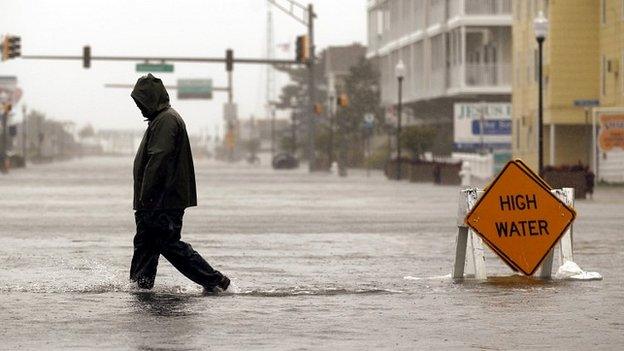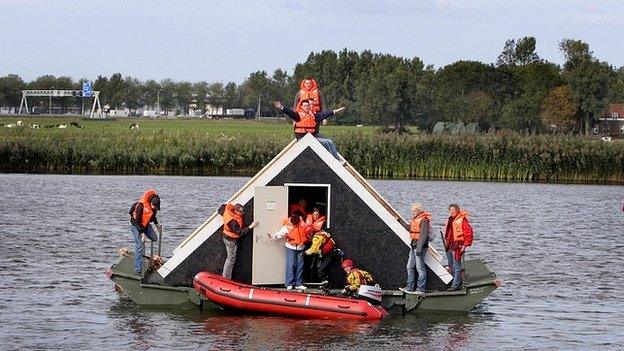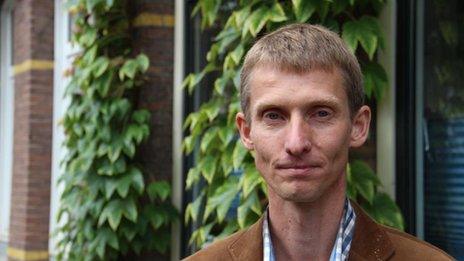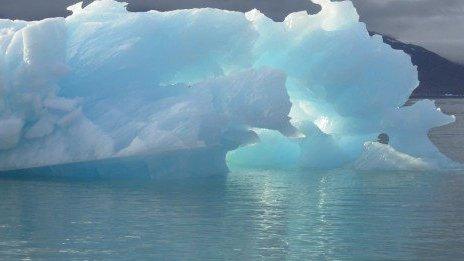Climate sceptics claim warming pause backs their view
- Published

Come hell or... An increased likelihood of extreme weather events is one predicted outcome of global warming, but some dispute the scale of expected effects
In the run up to a key global warming report, those sceptical of mainstream opinion on climate change claim they are "winning" the argument.
They say a slowing of temperature rises in the past 15 years means the threat from climate change is exaggerated.
But a leading member of the UN's panel on climate change said the views of sceptics were "wishful thinking".
The pause in warming was a distraction, he said, from the growing scientific certainty about long-term impacts.
Prof Jean Pascal van Ypersele spoke to BBC News ahead of the release of a six-yearly status report into global warming by the UN panel known as the Intergovernmental Panel on Climate Change, or IPCC.
Scientists and government representatives are currently meeting in Stockholm, Sweden, going through the dense, 31-page summary of the state of the physical science behind climate change.
When it is released on Friday, the report is likely to state with even greater certainty than before that the present-day, rapid warming of the planet is man-made.

Climate change could profoundly impact the Netherlands, but sceptics remain influential there
But climate sceptics have focused their attention on the references to a pause or hiatus in the increase in global temperatures since 1998.
The sceptics believe that this slowdown is the most solid evidence yet that mainstream computer simulations of the Earth's climate - climate models - are wrong.
These computer simulations are used to study the dynamics of the Earth's climate and make projections about future temperature change.
"The sceptics now have a feeling of being on the winning side of the debate thanks to the pause," said Marcel Crok, a Dutch author who accepts the idea that human activities warm the planet, but is sceptical about the scale of the effect.
"You are now starting to see a normalisation of climate science. Suddenly mainstream researchers, who all agree that greenhouse gases play a huge role, start to disagree about the cause of the pause.
"For me this is a relief, it is finally opening up again and this is good."
The view that the sceptics have positively impacted the IPCC is supported by Prof Arthur Petersen, who is a member of the Dutch government team currently examining the report.
"The sceptics are good for the IPCC and the whole process is really flourishing because of this interaction over the past decades," he told BBC News.
"Our best climate researchers are typically very close to really solid, sceptical scientists. In this sense scepticism is not necessarily a negative term."
Others disagree.
Bart Verheggen is an atmospheric scientist and blogger who supports the mainstream view of global warming. He said that sceptics have discouraged an open scientific debate.

Dutch writer Marcel Crok is sceptical about the sensitivity of the atmosphere to carbon emissions
"When scientists start to notice that their science is being distorted in public by these people who say they are the champions of the scientific method, that could make mainstream researchers more defensive.
"Scientists probably think twice now about writing things down. They probably think twice about how this could be twisted by contrarians."
Sensitive debate
In 2007, the IPCC defined the range for what's termed "equilibrium climate sensitivity". This term refers to the likely span of temperatures that would occur following a doubling of CO2 concentrations in the atmosphere.
The panel's last report said temperatures were likely to rise within the range of 2C to 4.5C with a best estimate of 3C.
The new report is believed to indicate a range of 1.5C to 4.5C with no best estimate indicated.
Although that might not appear like much of a change, many sceptics believe it exposes a critical flaw.
"In the last year, we have seen several studies showing that climate sensitivity is actually much less than we thought for the last 30 years," said Marcel Crok.
"And these studies indicate that our real climate shows a sensitivity of between 1.5C and 2C, but the climate models on which these future doom scenarios are based warm up three degrees under a doubling of CO2."
But other researchers who are familiar with the text believe that the sceptics are reading too much into a single figure.
"Some of what the sceptics are saying is either wishful thinking or totally dishonest," Prof van Ypersele, who is vice-chair of the IPCC, told BBC News.
"It is just a change in a lower border [of the range of temperature rise]. Even if this turns out to be the real sensitivity, instead of making the challenge extremely, extremely, extremely difficult to meet, it is only making it extremely, extremely difficult.
"Is that such a big change?"
Prof van Ypersele points out that many other aspects of the forthcoming report are likely to give greater certainty to the scale of impacts of a warming world. The predictions for sea level rise are likely to be considerably strengthened from 2007. There is also likely to be a clearer understanding of the state of sea ice.
- Published23 September 2013

